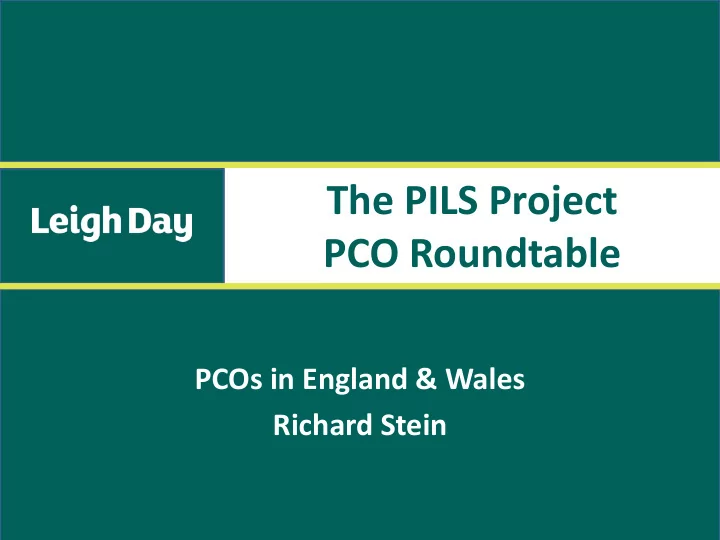

The PILS Project PCO Roundtable PCOs in England & Wales Richard Stein
Protective Costs Orders “Few would dispute that our procedures in the Administrative court, while no means perfect, are, for those who can afford them , ‘fair and equitable’; and despite the pressure on the Administrative Court’s list, they are capable of being ‘timely’ in really urgent cases. But who, apart from the very rich or very poor, can afford to use them? For the ordinary citizen, neither wealthy nor impecunious, can there be any real doubt that the Court’s procedures are prohibitively expensive?” Lord Justice Sullivan Forward to Ensuring Environmental Justice in England and Wales ( 2008)
Where did PCOs come from? Creative no costs orders at the end of cases eg R (FoE & Greenpeace) v SSEFRA [2001] EWCA Civ 1950 Cases on PCOs: R v Lord Chancellor ex p. CPAG [1999] 1WLR 347 Principle established but no order made CND v Prime Minister & ors {2002] EWHC 2777 PCO limiting CND’s costs to £25,000 R (RLC) v SSHD [2004] EWCA Civ 1296 & 1239 PCO – no order for costs – Claimant’s counsel acting pro bono
The Corner House case R (Corner House Research) v Secretary of State for Trade and Industry [2005] EWCA Civ 192
The Corner House criteria A PCO may be made at any stage of the proceedings on such conditions as the court thinks fit, provided that the court is satisfied that: – The issues are of general public importance. – The public interest requires that those issues should be resolved. – The Claimant has no private interest in the outcome of the case. – Having regard to the financial resources of the parties and the amount of costs likely to be involved, it is fair and just to make the order. – If the order is not made, the Claimant will probably discontinue the proceedings, and will be acting reasonably in doing so. If those acting for the Claimant are doing so pro bono this will be likely to enhance the merits of the PCO application. It is for the court, in its discretion, to decide whether it is fair and just to make the order in light of the above considerations.
General public importance & the public interest R (Compton) v Wiltshire PCT [2009] Smith LJ • No absolute standard • Are degrees to which requirement may be satisfied • Judges might reach different views without either being wrong!
No private interest • Goodson v HM Coroner for Bedfordshire [2005] EWCA Civ 1172 • R (England) v LB Tower Hamlets [2006] EWCA Civ 1742 • R (Eley) v SSCLG (1 July 2008) • R (Public Interest Lawyers v Legal Services Commission [2010] EWHC 3259
Cross cost capping • Quid pro quo for a PCO • Fees for two counsel • Recovery of CFA success fees • Modest fees
Other issues • Pro bono representation • PCOs on appeal - R (Compton) v Wiltshire PCT • PCOs for Defendants
Procedural requirements • PCO application with claim – with evidence of means and schedule of future costs • Defendant/interested party response • Decision with permission on papers • Oral reconsideration – 1 hour hearing • Costs exposure • Setting aside applications
Problems with the PCO regime • With CFAs – all risk on Claimant lawyers • Inadequacy of costs cap • Frequent/lengthy satellite litigation • Uncertainty about whether will get a PCO & if so for how much • Major uncertain costs exposure / interim PCOs
Aarhus / environmental cases • The bright light! • Sullivan working party • Adoption by EU • Compton CA • Not prohibitively expensive • Aarhus Compliance Committee • UK attempts to comply
Aarhus PCOs • What is covered? • Broadly the same across the UK • Model of simplicity – satellite litigation discouraged • Can £5k & £10k be challenged? • Only JRs? Statutory appeals? Private law cases? • Position on appeal? • Position with interim injunctions • VAT
Criminal Justice and Courts Bill 2014 • Statutory formulation of Corner House criteria • Only after leave for JR granted • Only in compliance with rules to be made by Lord Chancellor • LC may decide if proceedings are public interest proceedings • Reciprocal cap must be imposed
Recommend
More recommend